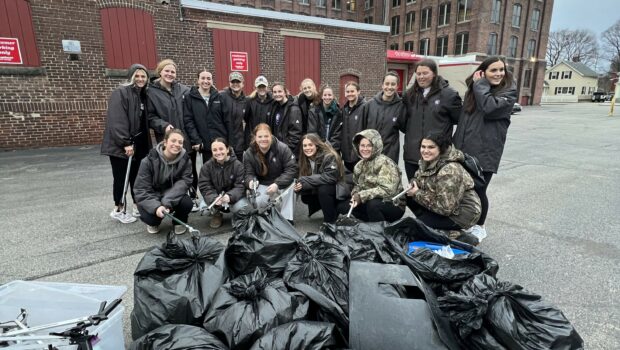Reducing Single-Use Plastics In The New Year
by Miranda Hotham, Worcester Green Corps Coordinator
It’s undisputed that the COVID-19 pandemic has changed the world around us in so many ways. While most people think about a new life with mask mandates, vaccines, and working from home, many environmentalists fear that the pandemic put a major hampering on sustainability practices, especially the attempts to reduce reliance on single-use plastics. If you set a resolution in 2020 to eliminate single-use plastics of any kind, you may have abruptly abandoned your new practice when panic and confusion began swirling the information of the virus. You weren’t alone, and many did not have a choice in the matter.
At the government level, numerous states and cities across the US reversed bans on plastic bags and straws, forcing consumers to abandon their eco-friendly practice in hopes that this would slow the spread of the virus. Here in Worcester, we saw a temporary ban on our reusable bags, leaving shoppers no other choice but to use the plastic and paper options in the grocery store. Coffee shops no longer allowed people to bring their reusable cups, and some places even reversed their ban on plastic straws and Styrofoam containers.
Additionally, the production of single-use plastics rose as a result of the pandemic. Originally, there was concern that the virus was able to be transmitted on almost anything, which led to a lot of confusion about what was safe to re-use and how to safely disinfect items. As a result of this misconception, many consumers and business operators turned to disposable products to ensure there was limited contamination. The pandemic also resulted in the increased use of disposable personal protective equipment (PPE) such as masks, gloves, and face shields. Lockdowns and social distancing also led to a spike in online shopping, which generated even more waste per household from all the packaging. The increase in demand for single-use plastics combined with the reduction in restrictive legislation, along with the spread of misinformation, exasperated an already out of control trash problem.
Nearly three years later, we now know much more about the virus and are better situated to commit to sustainable practices. While legislation is slowly enacted again, it is important that consumers also reduce the overall demand for single-use plastics. By decreasing consumption of these goods it is predicted that there will be a significant slowdown in production of new plastic items.
It seems like an overwhelming issue and individuals often feel that there is little they can do themselves to relieve the problems we’re facing. But the truth of the matter is that consumers drive demand, and through a change in demand, consumers can help eliminate the reliance on single-use plastics.
To start, just consider one area of your life where you can reduce or eliminate single-use plastics. Maybe it’s how you buy and store groceries, use personal hygiene products, order takeout and to-go drinks, or even your cleaning practices. There are now plenty of options available locally and online that allow you to switch to a sustainable model, it’s just a matter of choosing where to start!
Still need some inspiration? Here are some ways that you can reduce your single-use plastics:
-Buying and storing groceries: Go one step further than the reusable grocery bag, and consider bringing a reusable produce bag. If the option is available, buy wholesale to reduce the amount of packaging used. For storing food, eliminate saran wrap and plastic bags by opting for reusable storage options. You’d be surprised how many things exist now for food storage solutions!
-Personal hygiene products: Lots of products are now refillable, like shampoo, conditioner, body soap, hand soap, toothpaste, and floss! Shop at our local refillery or check online for sustainable products.
-Cleaning products: Many cleaning companies have taken significant strides to reduce the amount of waste generated from their products. Consumers are now able to buy simple tablets or solutions, add these to a bottle they already own, and simply fill with water. You now have a completely refilled cleaning product!
Furthermore, the City of Worcester is committed to improving how we handle waste as a community. Here are the most important things to know if you participate in the city’s curbside recycling program:
-Use bins, not bags.
o Recycled materials should be placed in bins, boxes, or paper bags. Plastic bags will not be accepted and will be left on the curb.
-No plastic bags.
o Plastic bags are not recyclable in our curbside program. They contaminate the waste stream and can be problematic at the Materials Recovery Facility. To recycle your plastic bags, bring them to your local grocery store.
– Make sure items are clean and dry.
o There should be no food residue on anything in your recycle bin. Make sure to rinse all containers so that there is no contamination.
-Put your waste on the curb in the morning, NOT the night before
o Many Worcester residents put their household waste on the curb the night before the truck comes to their neighborhood. This practice is not only against the programs guidelines, but can also lead to a major increase in litter in your neighborhood. When left overnight, bins are more likely to spill over or have animals comb through them. It’s best practice to put your materials on your curb first thing in the morning.
-Sign up for citizen alerts to stay up to date on trash pickup delays.
o Visit the city’s website to register for the alert system so you will always know if your pickup day is delayed (or not) by a holiday.
The pandemic may have stalled some world’s efforts to eliminate reliance on single-use plastics, but three years later, we are now in a position to get right back on track. Make 2023 the year you make your household model more sustainable.





